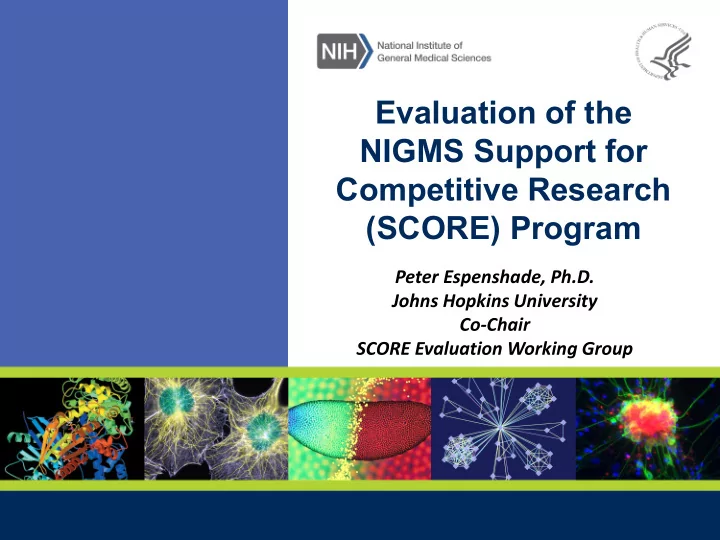

Evaluation of the NIGMS Support for Competitive Research (SCORE) Program Peter Espenshade, Ph.D. Johns Hopkins University Co-Chair SCORE Evaluation Working Group
SCORE Evaluation • Support for Competitive Research Program • Comprises 3 mechanisms (SC1/SC2/SC3) to support research and career development at institutions serving underrepresented groups. o Awards are made for investigator-initiated projects. o Investigators are ultimately expected to obtain and transition to non- SCORE funding. • A working group of Council was convened to evaluate the SCORE program: o Co-chairs: Kaye Husbands Fealing, Ph.D. and Peter Espenshade, Ph.D. o Panel: Drs. Squire Booker, Goldie Byrd, Lourdes Echegoyen, Elena Bastida, Bill Gern, Mark Lee, and Carlos Gutiérrez. • Comprehensive data on SCORE applications, awards, trends, and outcomes were provided by NIGMS OPAE. 2
SCORE Funding Mechanisms 3
Evaluation Questions 1) Is the SCORE program meeting its objectives? 2) Are the current program objectives the right objectives? 3) What challenges or difficulties has the SCORE program faced? 4) What are key findings and recommendations? 4
Evaluation Findings 1) Is the SCORE program meeting its objectives? Increases in research competitiveness, number of underrepresented investigators, number of qualifying laboratories, but few investigators transitioned to non-SCORE funding . 2) Are the current program objectives the right objectives? While some current objectives are appropriate, others require substantive change. 3) What challenges or difficulties has the SCORE program faced? o Institutional support for PI and institutional readiness and commitment to growth are uneven. o SCORE is too concentrated in a few college/university systems. o Only 30% of SCORE awardees and applicants are racial/ethnic minorities. o Only 57% of SC2 awardees submit any later/subsequent SCORE applications. 4) What are the key findings and recommendations? Discussed on following slide. 5
Recommendations 1) Modify program objectives to catalyze institutional support for SCORE funded investigators. 2) Revise SCORE PI expected outcomes. 3) Modify program objectives to prioritize increasing the number of students engaged in quality research. 4) Revise or consolidate funding mechanisms. 5) Develop prospective evaluation plan that aligns data collection with new objectives. Note: Both recommendation 1 and 3 are modifications to the objectives, but are provided separately to emphasize priorities. 6
Recommendation 1: Modify Program Objectives to Catalyze Institutional Support for SCORE Funded Investigators • Suggested Action Items • Require plan for institutional development of research capacity. • Require plan for SCORE PI support and development. • Rationale • Data show awards are concentrated in a few colleges/university systems , suggesting varying levels of institutional capacity to support applicants and awardees. • There is a need to increase institutional commitment to growing research capacity through support of individual SCORE investigators. • There is a need to catalyze change in institutional research culture and infrastructure. 7
Recommendation 2: Revise SCORE PI Expected Outcomes • Suggested Action Items Fraction of Cohort with • Expand qualifying funding Subsequent R01-Equivalent Funding 0.2 beyond R01. 0.18 • Define competitiveness to align with SCORE goals. 0.16 Fraction of Investigators 0.14 • Rationale 0.12 • Research excellence is a 0.1 priority. 0.08 • Data show SCORE awardees 0.06 rarely apply for or receive 0.04 R01s. • “Research competitiveness” 0.02 is ambiguous. 0 2008 2009 2010 2011 2012 2013 2014 2015 2016 2017 2018 2019 Cohort SCORE Unfunded Applicants SCORE Awardees 8
Recommendation 3: Modify Program Objectives to Prioritize Increasing the Number of Students Engaged in Quality Research • Suggested Action Items • Clarify student involvement in SCORE supported research in the FOA. • Prepare prospective evaluation of student involvement in SCORE. • Rationale • There is a need to: a) Increase the number of underrepresented students engaged in high quality motivating research, and b) Prepare the next generation of underrepresented faculty. 9
Recommendation 4: Revise or Consolidate Funding Mechanisms • Suggested Action Items Fraction of Cohort with • Eliminate the SC1 mechanism. Subsequent R01-Equivalent Funding 0.25 • Strengthen the SC3 mechanism. • Maintain the SC2 mechanism. 0.2 Fraction of Investigators • Rationale • Allows continued participation in 0.15 SCORE. • Few SC1 awardees received R01 0.1 awards. • Supports institutional capacity 0.05 building through continued participation. 0 • Stabilizes research opportunities 2008 2009 2010 2011 2012 2013 2014 2015 2016 2017 2018 2019 for students. Cohort SC1 Awardees SC2 Awardees SC3 Awardees 10
Recommendation 5: Develop a Prospective Evaluation Plan That Aligns Data Collection with New Objectives • Rationale • Need more robust, complete, and relevant evaluation data. • Evaluation (including prospective evaluative strategies) is a priority outlined in the NIGMS Strategic Plan. • Example • Data on students participating in SCORE-supported research is not currently collected but will be necessary to evaluate new objectives. 11
Summary • SCORE is meeting many of its current objectives…. • SCORE has increased the number of labs and underrepresented PIs at eligible institutions; PI research competitiveness has also increased, but • Few SCORE PIs transitioned to non-SCORE funding. • Objectives, however, should be examined and appropriately modified. • More emphasis needed on the institutional role in SCORE (e.g., support for PIs, plans for growth). • Supporting opportunities for student research should be an explicit program goal. • SC1 ($250k, R01-like) should be eliminated, SC3 ($75k, R15-like) should be strengthened. 12
Recommend
More recommend